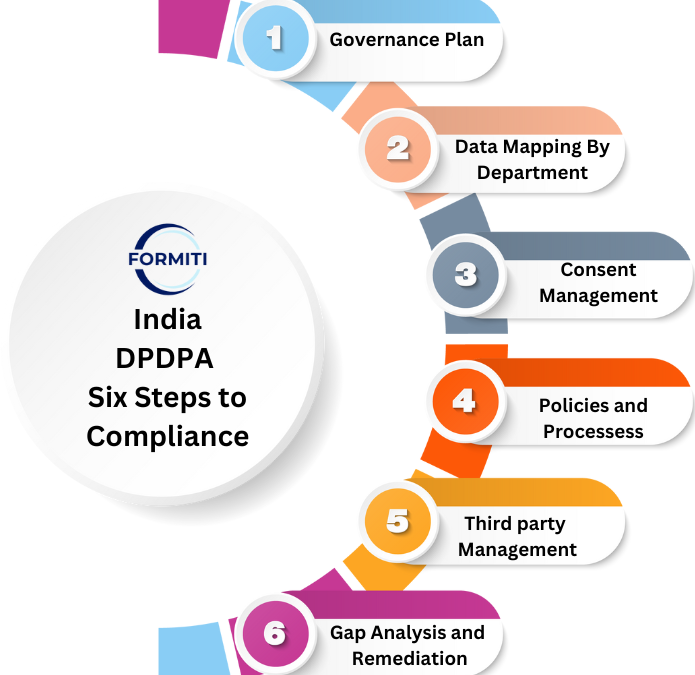Introduction
As the enforcement date for India’s Digital Personal Data Protection Act (DPDP Act India) rapidly approaches, organisations across the nation must ensure they are fully compliant with the new regulations. Failure to comply can result in severe penalties, including hefty fines and significant damage to brand reputation. This article outlines the six essential steps Indian companies need to take to achieve and maintain compliance with the DPDP Act.
1. Governance Planning
Effective governance planning is the foundation of any successful data privacy compliance programme. This step involves establishing a clear framework for data protection within the organisation. Key actions include:
- Appointing a Data Protection Officer (DPO) responsible for overseeing compliance efforts.
- Forming a data protection team to support the DPO.
- Developing a comprehensive data protection strategy that aligns with the organisation’s objectives and regulatory requirements.
Governance planning ensures that all levels of the organisation understand their roles and responsibilities in maintaining data privacy standards.
2. Data Mapping by Department
Data mapping is a critical exercise that involves identifying and documenting the flow of personal data within the organisation. Each department should undertake a thorough review to determine:
- What personal data is collected and processed.
- The purposes for which the data is used.
- Where the data is stored and how it is transmitted.
- Who has access to the data.
This step helps organisations understand their data landscape, identify potential risks, and implement appropriate safeguards to protect personal information.
3. Consent Management
Under the DPDP Act, obtaining valid consent from data subjects is paramount. Organisations must ensure that:
- http://india consentConsent is obtained in a clear, informed, and specific manner.
- Individuals are provided with transparent information about how their data will be used.
- A mechanism is in place for individuals to withdraw their consent at any time.
Effective consent management not only ensures compliance but also builds trust with customers by demonstrating a commitment to respecting their privacy.
4. Policies and Processes
Establishing robust data protection policies and processes is essential for maintaining compliance. Key areas to address include:
- Data protection policies outlining the organisation’s commitment to safeguarding personal information.
- Procedures for handling data breaches, including reporting and mitigation measures.
- Employee training programmes to ensure staff are aware of their responsibilities and best practices for data protection.
Regularly reviewing and updating these policies and processes ensures they remain effective and aligned with evolving regulatory requirements.
5. Third-Party Management and Contracts
Organisations must carefully manage their relationships with third-party vendors who process personal data on their behalf. Key steps include:
- Conducting due diligence to ensure third parties comply with the DPDPA.
- Incorporating data protection clauses into contracts to specify responsibilities and obligations.
- Regularly monitoring and auditing third-party practices to ensure ongoing compliance.
Effective third-party management mitigates risks associated with outsourcing data processing activities and ensures that all parties adhere to the same high standards of data protection.
6. Gap Analysis and Remediation
Conducting a comprehensive gap analysis is crucial to identify areas where the organisation’s current practices fall short of DPDPA requirements. This process involves:
- Reviewing existing data protection measures against DPDPA standards.
- Identifying gaps and areas of non-compliance.
- Developing and implementing a remediation plan to address these gaps.
Regular gap analysis and remediation efforts ensure that organisations stay on track with their compliance journey and continuously improve their data protection practices.
7: Penalties for Non-Compliance
Non-compliance with the DPDP Act India can result in severe penalties, including fines of up to ₹5 crores or 2% of the company’s global turnover, whichever is higher. Beyond financial penalties, non-compliance can lead to significant brand damage, loss of customer trust, and potential legal action. Organisations must prioritise compliance to avoid these repercussions and maintain their reputation in the market.
Conclusion
Achieving and maintaining compliance with India’s DPDP Act is a complex but essential task for organisations. By following these six steps—governance planning, data mapping by department, consent management, establishing policies and processes, managing third-party contracts, and conducting gap analysis and remediation—companies can ensure they meet regulatory requirements and protect personal data effectively.
Formiti Data International Ltd is dedicated to helping Indian organisations navigate the complexities of DPDPA compliance. Our expert consultants work closely with businesses to develop tailored compliance strategies, ensuring they are fully prepared for the enforcement of the new law. Contact us today to learn how we can support your organisation in achieving and maintaining DPDPA compliance.

